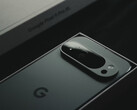The Google Pixel 9a has received numerous changes, particularly in terms of design, display size, battery capacity and its SoC. Additionally, its water resistance has been improved to an IP68 certification. Despite new AI features, these remain slightly limited compared to Google's flagship models. The recommended retail price remains unchanged at $499 for 128GB and $599 for 256GB, but the phone can already be found cheaper at Amazon and many other retailers.
The more angular chassis is available in four colors and, despite maintaining the same height, appears thicker than its predecessor. The camera module is more compact and flatter, and the overall build quality is high, with just minor weaknesses on the back. The matte aluminum is fingerprint-resistant and comfortable to hold. On the front, the Pixel 9a uses Corning Gorilla Glass 3, which is no longer cutting edge.
In terms of performance, the Pixel 9a is based on the Tensor G4 with 8GB of RAM. CPU performance is solid, but when it comes to the GPU and memory bandwidth, it’s inferior compared to the larger Pixel models. Temperatures are not critical, but the phone throttles under sustained load. The speakers are also good, but not very neutral at high volumes. Audio output is possible via USB or Bluetooth, but Google does not provide information on supported codecs. Auracast is not supported either.
Overall, the Google Pixel 9a impressed our reviewer with its high performance, long software update support, good cameras, high display brightness and long battery life. Points of criticism include the limited storage options, the moderate charging speed, and the lack of high-end features found in the more expensive models.




























